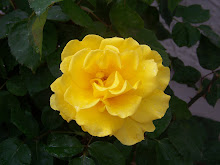It may have started with a love of aromatherapy. Or perhaps it started on the day I walked into Lush in Vancouver, Canada and was dazzled by the tantalizing array of enormous blocks of richly scented soap. The only thing I can say for sure is that for years I have harbored a secret fantasy of becoming a Soap Witch.
I have played around with melt and pour soap. It's a type of soap you can buy in block form, melt it down, add color and fragrance, and pour into molds. It's fun. But while some do call the process of crafting with melt and pour "soap making," I prefer to call it "soap crafting." Real soap making requires study, commitment, dedication, perseverance, and a touch of courage. (If you don't believe me, read about what will happen if you accidentally add the water to the lye instead of the other way around.)
For years I've been vacillating back and forth between what is easy, like stopping at the grocery store for a bottle of dish washing liquid, and tinkering with various recipes for homemade dish and laundry soaps and other housecleaning products. There are a thousand uses for vinegar and baking soda, and not all of them involve food. Liquid castile soap possesses a richness and purity that liquid detergent sometimes tries to imitate - but why use an imitation if one can have the real thing? Gradually, my homemade methods are improving and winning out over the rest. I still keep Dawn detergent around to combat petroleum based oil stains, but as I find better alternatives to these things and become comfortable using them, my methods will change. Now I refill old laundry detergent containers with homemade laundry soap.
Many people don't realize this, but most of those foaming and lathering products found in typical grocery stores are not real soap. They are detergent. In the 1940's, when the materials needed to make soap became scarce due to the war, petroleum-based detergents took the place of soap. These caught on, mainly because they are so cheap to make.
Once one develops a taste for soap, detergent-based bars and liquids are a mere shadow of the real thing. There is something simple, honest and nurturing about soap.
So, why a Soap Witch, and not a Soap Aficionado or Soap Gourmet? Three reasons, actually. First off, there is magic in soap. There exists this special moment when the alkali and the fat transform into a third thing - soap. This often happens while stirring a batch of soap. You can see it, but you can also feel it through the spoon you are stirring it with. That is a deeply peaceful, magical moment for me. Secondly, these days modern Western witches often see themselves as people who live close to and in harmony with the earth and listen to her secrets. I do think soap making can be a way of expressing these values. And lastly, the witches of yesterday were the village wise women and healers. Their place in the community was one of practical usefulness. If I am very lucky, I may enjoy the status of wise woman myself one day.
While soap is not a form of medicine, how healthy would we be without it? Perhaps washing with soap is the most basic and fundamental form of healing.
Wednesday, September 2, 2009
Subscribe to:
Posts (Atom)

